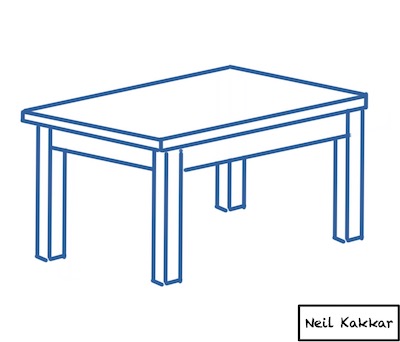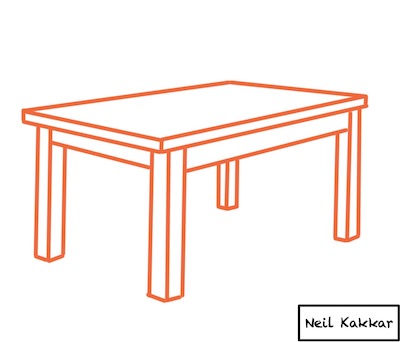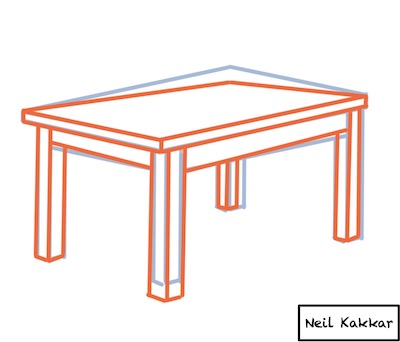Big Ideas from Rationality I've Found Repeatedly Useful
“You think you can use math to solve every problem? Fuck your rationality”, raged Drake.
“No, Drake, I was pointing out the rational choice. Don’t sacrifice the ship. Don’t let your emotions get in the way.”
It’s surprising how well that dialog can fit into any conversation. This could easily be Captain Kirk and Spock, too!1
But, they’re all wrong.
If anything, not taking clues from your emotions is irrational - they’re valuable signals from the body.
Rationality isn’t just about math and statistics. It’s figuring out tools and tricks that help you win. Less formally, it’s the art of not being stupid. In a surprising number of cases, winning is about not being stupid. Much like folding on a poker hand with less than X% chance of winning.2 You don’t win the round, but you stay around to win the tournament. Same with investing - if you keep “not losing” money, eventually you’ll end up rich.
Here are 5 ideas that have helped me be less stupid. Most of these come from Eliezer’s sequences. It’s a big book, clocking in at 2,000 pages. I’m writing this because I haven’t yet gotten Drake to read the sequences. It’s a small introduction that hopefully gets you excited about the field.
Map and the territory
Each one of us has a model in their mind about how the world works.
You can test it out by simulating hypotheticals in your mind. “What will happen if you ask to kiss random people on the street?” Your answer is an output of your model.
You may think everyone will say yes.
You may think you’ll die of embarrassment
You may think what others around you will think
You may think how your girlfriend / boyfriends won’t be happy and how it will hurt them.
This model isn’t reality. You don’t know what will happen till you try it, but with some things you experience everyday, the model is very well calibrated to predict reality.
This isn’t the only model we have. Our field of work, physics, business, psychology, relationships are all models in our mind: some richer than others.
If you are temporarily ignorant about a phenomenon, that is a fact about your current state of mind, not a fact about the phenomenon.
If you don’t understand something, that’s a fact about your model, not reality. You not understanding something doesn’t make it dumb or non-sensical. Some people perhaps do understand it.
Like Bret Victor explains:
It’s tempting to judge what you read: “I agree with these statements, and I disagree with those.”
However, a great thinker who has spent decades on an unusual line of thought cannot induce their context into your head in a few pages. It’s almost certainly the case that you don’t fully understand their statements.
Instead, you can say: “I have now learned that there exists a worldview in which all of these statements are consistent.”
Finally, not all models are created equal. Some people think better than others, which means their models are better. Make your models pay rent - keep the ones that help you predict and work through reality, and discard the ones that don’t.
It’s a lot like software updates: every day you get a chance to update your models. The difference is that you have to create these updates yourself. A singularity begins when you figure out how to update your brains like software.
One of the best ways to do this is via noticing confusion. Confusion is the difference between what your models predict and reality.
Noticing confusion
Your strength as a rationalist is your ability to be more confused by fiction than by reality. If you are equally good at explaining any outcome, you have zero knowledge.
This is the meta skill of noticing when you have a phlogiston theory on your hands.
In the 17th century, phlogiston theory was the popular explanation of combustion. It said everything combustible contains phlogiston, which is released on burning. Growing plants then absorb this phlogiston, which is why air doesn’t spontaneously combust and also why plant matter burns so well.
Can you guess what’s wrong with it? Notice how you could replace phlogiston with electrons or oxygen and carbon dioxide, and it will still be true. Just having a different name isn’t wrong.
…
..
.
There’s this split second feeling where you’re trying to work through it, and at the source of confusion, you flinch away. “This is stupid!”. “Duh, of course combustion doesn’t work that way, there’s no phlogiston.”
The problem is we notice the problem and then ignore it, instead of grabbing on to that uncertainty and getting to the root of it.3
Think though? How would you disprove the phlogiston theory? It’s a scientific theory, which means it doesn’t explain away everything. It constrains what’s possible. To show it’s wrong, you have to show what it says doesn’t happen. Antoine Lavoisier showed this by combusting phosphorous, and noticing that the total weight afterwards was larger, implying something was added, not removed during combustion.
Unfortunately, scientists are prone to the same mistakes as non-scientists, and married to their theories, they’ll try to explain away all inconsistencies. Like for phlogiston theory by claiming phlogiston to have negative mass.
This reaction is the default I’ve seen. We try to force our models to explain everything. You tell someone X is true and they try to come up with reasons why it must be true.
Similarly, you tell someone Y is false, and they try to come up with reasons why it must be false. In face of no better reason, the answer is usually “it’s dumb”.
And if you hate the person telling you something is true, you try to come up with reasons it must be false.
This is rationalisation, which is the opposite of rationality.
A lot of rationality is discovering ideas like these, and noticing the split second feeling before you turn to your default. It’s a game that helps you win at life.
Of course, this exercise doesn’t just apply to phlogiston, where you now know it to be false. What about emergence? Or god?4
Noticing confusion is about retraining your brain to not flinch away.
Cached thoughts
In most conversations, we’ve already thought about what we’re going to say. It’s the way the brain works. Given how slow each neuron is compared to the fast transistors in computers, the only way for the brain to keep up is to have a huge cache. It remembers every important thing it figures out so it doesn’t have to compute it again.
Complete the pattern:
No pain, no __.
What doesn’t kill you makes you __.
__ gives meaning to life.
Our brain completes the pattern.
If we have to re-think everything from scratch, we wouldn’t survive.
These are grooves for thinking. It’s very easy to fall into them and repeat what we have already heard, because one of the prime ways for patterns to form is not thinking originally, but hearing what other people say.
Every time we repeat a pattern, the neuron pathway strengthens. The mind is like a big iron sheet. Every time you think of a pattern, you hammer that area of your mind more. Soon enough, you’ll get a nice valley, and you’ll want to stay in there, since getting out takes effort. Every day you stay in the pattern, you’re hammering the sheet further.
An example from my Twitter (read the full thread):
1\ Do you know that TV Trope where a student gets a 0, but then the teacher says "On this MCQ test, not knowing anything would mean you get 50%. You got 0%, which means you knew all the right answers and ticked the wrong ones". The teacher then turns the 0 into a 100..
— Neil Kakkar (@neilkakkar) May 1, 2020
.
Relying on your cache prevents you from noticing what’s in front of you. One of the biggest revelations for me came from learning how to See when I draw. Imagine drawing a table. Scratch that, look at a table in front of you and draw it.
Most people draw something like this because they aren’t really Seeing, they’re just completing the pattern already in their brain:

Nice uniform lines throughout
Notice how the right end feels too big. If you measure though, it’s the exact same width throughout. However, when you see you realise that even though the table has the same width throughout, it’s not what you see. What the table actually looks like is this:

Obeying the laws of perspective - drawing what you see
Perspective distorts the true shape. Nobody sees the true shape without effort.

Having already seen something prevents you from noticing.
Another story to make the point:
He’d been having trouble with students who had nothing to say. At first he thought it was laziness but later it became apparent that it wasn’t. They just couldn’t think of anything to say.
One of them, a girl with strong-lensed glasses, wanted to write a five-hundred word essay about the United States. He was used to the sinking feeling that comes from statements like this, and suggested without disparagement that she narrow it down to just Bozeman.
When the paper came due she didn’t have it and was quite upset. She had tried and tried but she just couldn’t think of anything to say.
It just stumped him. Now he couldn’t think of anything to say. A silence occurred, and then a peculiar answer: “Narrow it down to the main street of Bozeman.” It was a stroke of insight.
She nodded dutifully and went out. But just before her next class she came back in real distress, tears this time, distress that had obviously been there for a long time. She still couldn’t think of anything to say, and couldn’t understand why, if she couldn’t think of anything about all of Bozeman, she should be able to think of something about just one street.
He was furious. “You’re not looking!” he said. A memory came back of his own dismissal from the University for having too much to say. For every fact there is an infinity of hypotheses. The more you look the more you see. She really wasn’t looking and yet somehow didn’t understand this.
He told her angrily, “Narrow it down to the front of one building on the main street of Bozeman. The Opera House. Start with the upper left-hand brick.”
Her eyes, behind the thick-lensed glasses, opened wide.
She came in the next class with a puzzled look and handed him a five-thousand-word essay on the front of the Opera House on the main street of Bozeman, Montana. “I sat in the hamburger stand across the street,” she said, “and started writing about the first brick, and the second brick, and then by the third brick it all started to come and I couldn’t stop. They thought I was crazy, and they kept kidding me, but here it all is. I don’t understand it.”
Neither did he, but on long walks through the streets of town he thought about it and concluded she was evidently stopped with the same kind of blockage that had paralyzed him on his first day of teaching. She was blocked because she was trying to repeat, in her writing, things she had already heard, just as on the first day he had tried to repeat things he had already decided to say. She couldn’t think of anything to write about Bozeman because she couldn’t recall anything she had heard worth repeating. She was strangely unaware that she could look and see freshly for herself, as she wrote, without primary regard for what had been said before. The narrowing down to one brick destroyed the blockage because it was so obvious she had to do some original and direct seeing.
—Robert M. Pirsig,
Zen and the Art of Motorcycle Maintenance
You can read more online.
Roleplaying
In the social web around us, everyone’s trying to figure out their roles - society pulls them into their role, and they want to appear to fulfill this role. Fitting in is important, since it makes daily life easier.
But, it’s very easy to take it too far. This is where people are sufficiently happy to just play the role, without getting the actual thing done.
When this finally clicked, it was the most powerful thing I’d heard. It took an excellent Harry Potter fan fiction to do that for me. Harry on his first battle with Mr. Moody says:
You might say that Mr. Moody was testing me to see if I would try to fight him, or try to win. That is, whether I’d carry out the role of somebody fighting — use standard spells I already knew, even though I didn’t expect the consequences of that action to be victory — or if I’d search through unusual plans until I found something that could win.
Like the difference between a student who sits in class because that’s what students do, versus a student who cares enough to ask themselves what it takes to actually learn a piece of material, and practices however necessary — you see, Professor McGonagall?
There’s a difference between showing you’ve tried and actually trying. Most people can’t distinguish the two.
For example, this conversation with my friend, Drake, who just graduated into the Covid-19 economy. He spends two hours everyday applying for jobs online. I asked him if this is enough to find a job he likes. Drake said, “No, I probably won’t find one”. I inquired what he’s going to do about it, and he said he’ll continue trying.
In any other context, this would’ve been a normal conversation. But when you see things through the lens of Roleplaying, you realise how people sometimes are just playing the role. “Do you want to show you’ve tried, or do you want to actually get a job?” I pointed this out to Drake and it clicked for him.
Another way to think about Roleplaying is more dakka: If something is working, you need a reason not to do more of it. Roleplaying stops people from maximising their upside.
A classic is something that everybody wants to have read and nobody wants to read.
- Mark Twain
Cognitive biases
If Rationality had a front page on the internet - it would be this. Everyone has a vague idea of a few biases, some spend time reading through every bias they can find - and call it a day for Rationality. But this is a very small part of rationality. It’s probably the easiest to learn about, which is why it attracts so much attention on the web.
While they have been useful to me, I consider them level 1.5
They’re a good place to start. If you’ll read only one thing on cognitive biases, read this talk by Charlie Munger
… and then don’t forget to continue your journey.

Thanks to Nishit Asnani, Dev Kakkar, and Kashish Agarwal for reading drafts of this.
-
There’s a difference between being rational and playing the role of someone who might seem rational - more on that below. ↩
-
X isn’t a constant, and depends on the blinds as well as the money you have on you. ↩
-
This is where my predictions about your behaviour start becoming weak, so I’ll just choose one reasonable path! ↩
-
Not making claims about the validity of either of those things - just noticing what they can and can’t explain. ↩
-
Level 0 is no knowledge of biases, Level 2 is rest of this post. ↩
You might also like
- If Influence were a blog post
- Psychology of Human Misjudgment
- A Framework for First Principles Thinking
- A simplistic explanation to mental models
